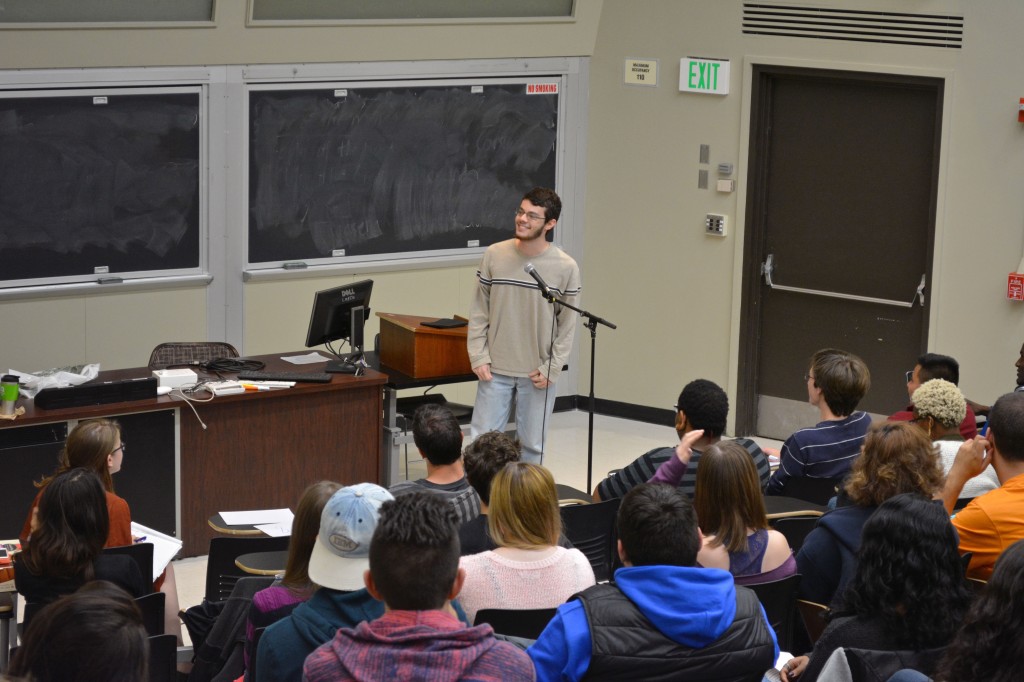
A lone microphone stood resolute before a murmuring crowd. Meanwhile, backstage, 10 restless competitors quietly rehearsed stanza after stanza of original poetry, each face broadcasting mixed feelings of nervousness and determination. Welcome, ladies and gents, to the first Poetry Slam of the semester, courtesy of the Slam Poetry Club. Get ready to sit back, relax and applaud with some snaps.
Originating out of the Green Mill, a Chicago jazz club, slam poetry adds a soulful and passionate twist to this classic form of literature. In 1986, Marc Smith organized the Uptown Poetry Slam, the first cabaret-style poetry competition of its kind, earning himself the moniker “Slam Papi.” Over the past 28 years, the Uptown Poetry Slam has continued to be a staple event at the Green Mill, and slam poetry’s theatrical manner of expression has spread its contagious influence across the nation.
Dan Roman, Slam Poetry Club president and a senior majoring in English, said he’s dedicated to the genre because of the connection a poet establishes with his audience as he performs.
“My favorite moments are when the audience doesn’t know anything about you when you walk up to the mic,” Roman said. “If you can make them laugh or feel something, then you know you performed well.”
As a platform for students’ creative voices, the Slam Poetry Club opens up various avenues for eager, endeavoring writers to share their work and receive insight on how to sharpen their skills. The club holds weekly meetings as well as performance workshops for poets to present original pieces and share ideas amongst peers. It will host a performance workshop open to the public on Oct. 16 at 7 p.m.
Lindsay Young, a club member and a junior majoring in psychology, has been thankful for her ability to share her personal musings among friends and trusted writers.
“I’ve been writing forever, but was too scared to perform,” Young said. “It feels so good when you are recognized for doing something that you love.”
Whether seen as a rebellious “up yours” toward structured poetry readings or simply an open forum for creativity and artistic acceptance, the competitive atmosphere of poetry slams are the driving force of the club. The rules are simple. There are three rounds of performances and each reading is scored by a panel of judges. The poets are allowed three minutes to perform their piece, and the highest-scoring competitors move on to the next round. After the final round, the judges are thanked, the winner is announced and a round of applause erupts for all of the poets.
Thursday night’s slam was particularly gutsy. Poets showed no fear as they made rhythmic commentary on dicey topics such as gender identity, misogyny, racism, sexual tension and death. Despite the informal mood of a slam, the audience’s open ears are receptive to whatever material the poet chooses to discuss, putting a lot of pressure on the poet’s performance.
“I have a panic attack before every single round,” Young said. “But, once you get past the first line without throwing up, everything else falls into place.”
Audience participation plays a part in poetry slams as well. The performer must read the crowd to get a sense of what topics and styles of performing are getting the best reaction. The result is a provocatively enjoyable show that sends viewers home thirsty for more.
“If you read a poem from a piece of paper, it’s difficult to understand the author’s emotion or intentions,” said Lorna Erb, a junior majoring in English. “The intensity was 10 times greater watching it live.”


